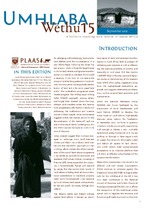| dc.contributor.author | PLAAS | |
| dc.date.accessioned | 2019-02-22T07:33:23Z | |
| dc.date.available | 2019-02-22T07:33:23Z | |
| dc.date.issued | 2012-09 | |
| dc.identifier.citation | PLAAS. (2012). Land redistribution: Part of a wider agrarian reform strategy: Umhlaba Wethu No. 15. Bellville Institute for Poverty, Land and Agrarian Studies, University of the Western Cape. | en_US |
| dc.identifier.uri | http://hdl.handle.net/10566/4268 | |
| dc.description.abstract | An emerging and increasingly more prominent debate amid the considerations of a new White Paper, following the Green Paper process, which will set the legal framework for land reform and agrarian transformation, is whether or not land reform is still a necessity. If not, how do we reverse the unequal land-holding patterns in South Africa? We have yet to see large-scale redistribution of land and a far more equal land outfit. The land-reform programme made limited progress. The Willing Buyer Willing Seller (WBWS) approach, among others, had largely been blamed. Given the insignificant land transfers under the land-reform programmes, the market is clearly not addressing the landlessness and insecure tenure of black people. What the evidence suggests is that the market allows for the de-racialisation of the better-off and creates a more equal ‘elitist’ landed group, but the WBWS cannot be made to work in favour of the poor. | en_US |
| dc.language.iso | en | en_US |
| dc.publisher | PLAAS | en_US |
| dc.relation.ispartofseries | Umhlaba Wethu: A quarterly bulletin tracking land reform in South Africa;15 | |
| dc.subject | Land redistribution | en_US |
| dc.subject | | en_US |
| dc.subject | Swellendam local municipality | en_US |
| dc.subject | Johann Kirsten | en_US |
| dc.subject | Game farms | en_US |
| dc.title | Land redistribution: Part of a wider agrarian reform strategy | en_US |
| dc.type | Other | en_US |

